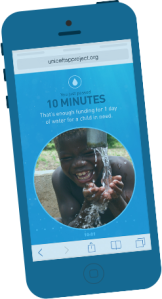
Image: GWP.org
I attended the recent briefing, “Targeting water in the post-2015 development agenda,” at the World Meteorological Organization in Geneva, Switzerland. Co-organized by UN-Water, the UN Economic Commission for Europe (UNECE), and the Swiss Agency for Development and Co-operation, the event hosted international mission staff as well as members of the press, academics and others. It focused on how water issues are being addressed within the evolving debate on potential sustainable-development goals (aka SDGs), in the framework of the post-2015 development agenda. The briefing’s documents and presentations are now available online.
The idea that water should have its own complex SDG, rather than being dispersed among other goals, seemed to be widely held and agreed upon at the event. Incorporating water issues into other goals without having a separate item for it could result in water-related issues evaporating in the mix.
“Because water is everywhere, water ends up being nowhere,” said panelist Jack Moss, senior water advisor at AquaFed: The International Federation of Private Water Operators. Water’s fearsome power in nature is not reflected in its (lack of) strength as a factor in economies, he added.
Panelists agreed that water is too often taken for granted, and not often-enough planned for in proactive and constructive ways. In other words, you consider it separately to help ensure it gets paid for.
“Any time an issue is cross-cutting, like water, you can be sure that some of your targets will be lost in other targets,” said Lesha Witmer, a steering committee member and co-coordinator of The Butterfly Effect coalition of NGOs. “If you have a dedicated goal, it can’t *not* be represented in a country’s national budget.”
The UN-Water paper “A Post-2015 Global Goal for Water: Synthesis of key findings and recommendations from UN-Water” was also presented during the event. In the 41-page report, you can see the goal taking shape. The goal, “securing sustainable water for all,” becomes mightily complex when put in the context of the world, its growing human population, economic development, pollution, climate change, public health and myriad other factors.
The Swiss government has taken a leading role on water issues, and its Swiss Position Paper on Water in the Post-2015 Agenda advocating for an explicit water goal was also presented at the briefing.
See documents and presentations from the briefing.
Related posts:
At the Point of ‘Peak Water,’ Our Foreseeable Future Grows Shorter
UNICEF Says Put Down Your Cell Phone for a Few Minutes to Help Kids Get Water
Mapping the World’s Most Water-Stressed Countries
Unchecked Emissions Will Drain Water Resources, Warns Leaked UN Report
The Intersection of Environmental Issues and Human Rights






